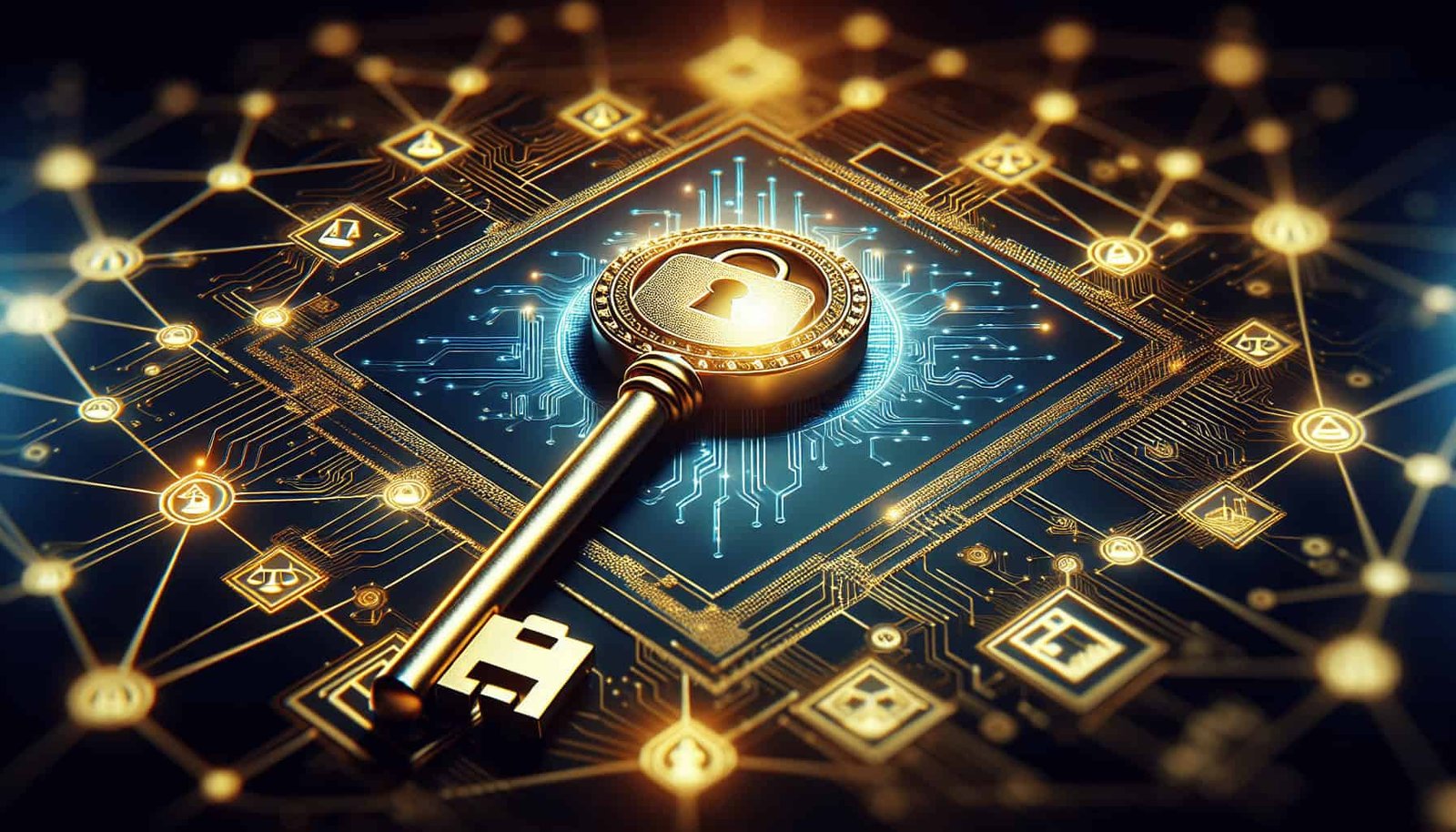Have you ever wondered how blockchain technology can revolutionize the way identity verification is conducted for legal purposes? Well, you’re in for a treat! In this article, we’ll explore the incredible potential of blockchain in ensuring secure and tamper-proof identity verification processes, which can play a crucial role in various legal scenarios. From enhancing privacy protection to streamlining digital transactions, blockchain’s decentralized and immutable nature holds great promise in safeguarding the integrity and authenticity of personal identities. So, let’s dive into the fascinating world of blockchain and discover how it can reshape the future of identity verification!
1. Introduction
Definition of blockchain
Blockchain is a decentralized digital ledger that records transactions across multiple computers or nodes in a secure and transparent manner. It allows for the creation of a permanent and immutable record of these transactions, which makes it an ideal technology for identity verification purposes.
Importance of identity verification for legal purposes
Identity verification is a crucial process in the legal field, as it ensures that individuals are who they claim to be. It plays a vital role in various legal proceedings, such as contracts, notarizations, court cases, and government services. However, traditional methods of identity verification often face challenges like privacy concerns, fraud, and identity theft. Blockchain technology offers a potential solution to overcome these challenges and revolutionize the way identity verification is conducted.
2. Current Challenges in Identity Verification
Traditional methods
Traditional methods of identity verification rely heavily on centralized authorities such as government agencies, financial institutions, or third-party verification services. These methods can be time-consuming, costly, and prone to errors or manipulation. Additionally, the reliance on centralized entities raises concerns about the misuse of personal data and privacy breaches.
Privacy concerns
Privacy is a growing concern in the digital age, as individuals become more aware of the risks associated with sharing personal information online. Traditional identity verification methods often involve the collection and storage of sensitive personal data, which can be vulnerable to hacking or unauthorized access. This raises concerns about the misuse of personal information and the potential for identity theft.
Fraud and identity theft
Identity theft and fraud are significant issues that plague the current identity verification systems. Hackers and fraudsters have become increasingly sophisticated in their methods, making it easier for them to impersonate others and deceive traditional verification methods. This not only puts individuals at risk but also undermines the integrity of legal processes and transactions.

3. How Blockchain Works
Decentralized and transparent nature
Blockchain operates as a decentralized network, eliminating the need for a central authority to verify and validate transactions. Instead, the network of computers, known as nodes, collaboratively maintains a shared ledger of transactions. This decentralized nature ensures that no single entity has control or ownership over the data, making it resistant to tampering or manipulation.
Smart contracts
Smart contracts are self-executing agreements with the terms of the agreement directly written into lines of code. They automatically execute and enforce the terms of the agreement without the need for intermediaries. Blockchain technology enables the use of smart contracts, which can enhance the efficiency and security of identity verification processes. These smart contracts can automate the verification process by comparing the data provided by individuals with predefined criteria, ensuring accuracy and reducing the risk of fraud.
Immutability and security
One of the key features of blockchain is its immutability. Once a transaction is recorded on the blockchain, it cannot be altered or deleted. This attribute makes blockchain a secure and reliable technology for identity verification. Any changes or updates to an individual’s identity information would require a new transaction, creating a transparent and auditable trail of identity changes.
4. Benefits of Blockchain in Identity Verification
Enhanced security and privacy
Blockchain technology employs robust encryption algorithms and cryptographic techniques to secure data. By decentralizing the storage and verification of identity information, blockchain reduces the risk of data breaches and unauthorized access. Personal data is stored securely on the blockchain, and individuals have control over their own data, allowing them to share only the necessary information required for identity verification, thereby addressing privacy concerns.
Reduced fraud and identity theft
Blockchain’s transparent and immutable nature makes it difficult for fraudsters to manipulate or counterfeit identities. Once an identity is recorded on the blockchain, it becomes part of an unchangeable history, making it easier to detect any attempts at fraud or identity theft. By eliminating the reliance on centralized authorities and introducing a trustless system, blockchain technology can significantly reduce the risk of fraudulent activities and protect individuals from identity-related crimes.
Efficiency and cost-effectiveness
Traditional identity verification processes can be time-consuming and expensive due to the need for manual verification and the involvement of multiple intermediaries. Blockchain-based identity verification can streamline this process by automating verification through smart contracts. The elimination of intermediaries not only reduces costs but also speeds up the verification process, enabling quicker and more efficient interactions in legal proceedings.

5. Use Cases of Blockchain in Identity Verification
Digital identity management for government services
Blockchain can transform how governments manage the identities of their citizens. By implementing blockchain-based identity systems, governments can create a secure and tamper-proof digital identity for individuals. This digital identity can be used for accessing government services, voting, filing taxes, and performing various legal transactions. It ensures accuracy, reduces fraud, and enhances the overall efficiency of government processes.
Know Your Customer (KYC) processes in financial institutions
Financial institutions, such as banks, regularly perform Know Your Customer (KYC) procedures to verify the identity of their customers. Blockchain can streamline and simplify this process by allowing individuals to maintain a digital identity that can be accessed by multiple financial institutions. This eliminates the need for repetitive verification processes and reduces the risk of identity theft.
Secure and tamper-proof documentation for legal purposes
Blockchain technology can provide a secure and tamper-proof method of storing and accessing legal documents. By recording legal documents on the blockchain, such as contracts, wills, and property titles, individuals can ensure the integrity and authenticity of these documents. This eliminates the need for physical copies and the reliance on intermediaries for authentication, making legal processes more efficient and less prone to fraud.
6. Implementing Blockchain for Identity Verification
Interoperability and standardization
For blockchain-based identity verification to be widely adopted, interoperability and standardization are crucial. Different blockchain platforms and systems need to be able to communicate and share data seamlessly. Implementing interoperability standards will ensure that individuals can use their digital identity across different platforms and services.
Collaboration between stakeholders
The successful implementation of blockchain for identity verification requires collaboration between various stakeholders, including government agencies, financial institutions, technology providers, and individuals. By working together, these stakeholders can define and establish the necessary frameworks, standards, and protocols to ensure the seamless integration of blockchain technology in existing identity verification systems.
Integration with existing systems
To ensure a smooth transition, blockchain solutions for identity verification need to integrate with existing systems and processes. This integration should be designed to minimize disruption and provide incremental improvements in security, efficiency, and cost-effectiveness. By leveraging existing infrastructure, organizations can maximize the benefits of blockchain technology without significant operational changes.

7. Potential Challenges and Risks
Scalability issues
Blockchain technology still faces scalability challenges, especially when applied to large-scale identity verification processes. As the number of transactions increases, the blockchain network may experience congestion and slow transaction speeds. Addressing scalability issues requires the development of innovative consensus mechanisms and the use of off-chain solutions to handle large volumes of identity verification requests.
Regulatory compliance
The adoption of blockchain for identity verification must comply with existing legal and regulatory frameworks. Ensuring regulatory compliance is essential to build trust and ensure the reliability and legality of blockchain-based identity verification systems. Governments and regulatory bodies need to work closely with technology providers to establish guidelines and regulations that govern the use of blockchain technology for identity verification.
Lack of public trust and adoption
Blockchain technology is still relatively new, and there may be a lack of public trust and understanding of its capabilities for identity verification. Overcoming this challenge requires education, awareness, and demonstration of the benefits of blockchain-based identity verification. Building trust among individuals and organizations will encourage wider adoption and pave the way for the implementation of blockchain solutions.
8. Case Studies
Estonian e-Residency Program
The Estonian e-Residency program is a prime example of how blockchain technology can be used for identity verification at a national level. Through this program, individuals can acquire a digital identity and access various government services online. The blockchain-based digital identity ensures secure and efficient interactions with government agencies, eliminating the need for physical presence.
Self-sovereign identity platforms
Self-sovereign identity platforms allow individuals to retain control and ownership of their digital identity. These platforms leverage blockchain technology to create a secure and decentralized identity verification system. Users can selectively disclose their identity information while maintaining privacy and protection against identity theft. Sovrin, uPort, and Evernym are prominent examples of self-sovereign identity platforms.
Blockchain-based legal document verification
Blockchain technology is being utilized to create secure and tamper-proof systems for legal document verification. Companies like Legaler and Seal are leveraging blockchain to authenticate and store legal documents, ensuring their integrity and accessibility. This improves efficiency in legal processes, eliminates the need for physical documentation, and reduces the risk of fraud.

9. Future Outlook
Integration with emerging technologies
As blockchain technology continues to evolve, it is expected to integrate with other emerging technologies such as artificial intelligence (AI) and Internet of Things (IoT). AI can enhance the accuracy and efficiency of identity verification processes by automating the analysis of identity data. IoT devices can provide additional sources of identity information, further enhancing the reliability and trustworthiness of blockchain-based identity verification systems.
Expansion of blockchain applications in the legal field
The potential applications of blockchain in the legal field are not limited to identity verification. Blockchain can be used for digital asset management, smart contract execution, dispute resolution, and intellectual property protection. These applications have the potential to transform the legal industry by increasing efficiency, reducing costs, and improving transparency.
Addressing privacy and security concerns
As blockchain technology becomes more prevalent in identity verification, it is essential to address privacy and security concerns. Striking a balance between transparency and protecting individuals’ personal information is crucial. Advancements in privacy-centric technologies, such as zero-knowledge proofs and differential privacy, can help overcome these challenges and ensure that blockchain-based identity verification systems maintain the privacy and security of individuals’ data.
10. Conclusion
Summary of the benefits of blockchain in identity verification
Blockchain technology offers several benefits for identity verification in legal purposes. It enhances security and privacy by decentralizing the storage and verification of identity information. Blockchain reduces the risk of fraud and identity theft through its transparent and immutable nature. It also improves the efficiency and cost-effectiveness of identity verification processes by automating verification through smart contracts.
Promising future prospects
The future of blockchain in identity verification looks promising. Blockchain has the potential to revolutionize how identity is verified, stored, and accessed for legal purposes. Through interoperability, collaboration, and integration with existing systems, blockchain can be seamlessly integrated into existing identity verification processes. Overcoming challenges, such as scalability, regulatory compliance, and public trust, will pave the way for widespread adoption and the realization of the full potential of blockchain in identity verification.

